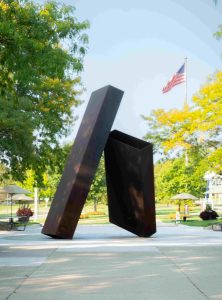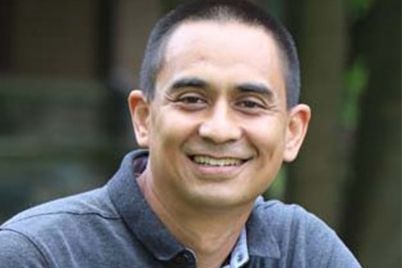
The Gateless Gateway outside the student center in a public forum. Courtney Prielipp | Washtenaw Voice
Lily Cole
Editor
Freedom of speech is ingrained in the culture of American citizens. However, understanding that right as a student may be difficult.
WCC’s Student Speech and Expressive Conduct Policy 8018, which governs freedom of expression on campus, states, “Expression of diverse points of view during academic pursuits is of the utmost importance to the open, lively, challenging spirit of inquiry that is basic to education.”
Linda Blakey, provost and chief operations officer at WCC, elaborated on the policy via email, “We are committed to fostering an environment where diverse perspectives can be expressed and discussed freely. The college is committed to respecting First Amendment rights, protecting the safety of everyone on campus, and ensuring that the educational process is not disrupted.”
Dan Korobkin, legal director of the ACLU of Michigan, discussed the bigger picture regarding freedom of speech on campuses.
“The purpose of the First Amendment is to make sure that the government, which includes public universities and public colleges, don’t put their hands on the scale of public discourse and dialogue about important social, political, and cultural issues. In other words, not all ideas in life are equally valuable or equally true, but the First Amendment promises that citizens themselves get to decide which ideas and positions are the most persuasive and the most compelling.”
According to Policy 4095, the Student Rights, Responsibilities, and Conduct Code Policy, students are entitled to all rights and protection accorded by the community law (Washtenaw County) of which the college is a part.
Korobkin added that government institutions, such as police, prosecutors, legislators, public colleges and public university administrators, don’t get to make those decisions on behalf of everyone else.
“Our college campuses, whether universities or community colleges, are supposed to be places where we have free dialogue and tough conversations,” WCC constitutional law professor Haley Slade said.
Slade highlighted the value of free speech for students and how we can balance it on our college campuses, allowing students to speak freely and have tough conversations while providing a safe environment.
“Looking at a college campus, you would definitely see that free speech protections are going to be greatest in outdoor walkways and areas where the general public has open access,” Korobkin said. “Those are called public forums, and then it’s going to be less protective in what we would call nonpublic forums, and that would include something like a classroom.”
Slade explained that if students walk to class and feel threatened or harassed, there needs to be a conversation with the group.
“We understand that you have this right to demonstrate and get your message across, but is there another way you can do it so that, you know, life on campus can continue to go on, and people can go to class and do the things they always do?” She said.
John Leacher, chief of Public Safety, emphasized the priority of keeping the overall campus community safe. “My job as a chief of public safety is to maintain safety for each side of an issue. Whether you’re the person who’s exercising your right to free speech or the person who opposes someone exercising their right to free speech, our job is to maintain the peace and make sure that everybody’s safe, and that’s students and non-students alike.”
“I think that we can achieve balance on our college campuses where we can allow students to speak freely and have these tough conversations and, at the same time, still protect public safety and still allow the rest of the campus community to do what they always do,” Slade said.
For more information about knowing your rights, visit https://www.aclu.org/know-your-rights/protesters-rights


